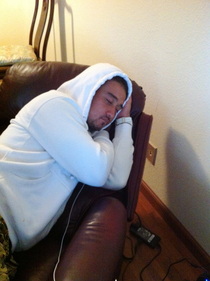 Happy New Year, Grandma / AlisonR It got to be the new year. At 12:03 I jumped up from the couch and greeted the year in the usual way. My grandson, who had worked overtime until 11 o’clock, bolted upright from the recliner where he had fallen immediately to sleep, pulled out his ear buds and distractedly said, “Happy New Year, Grandma,” only to fall back into sleep. Rather than resolve to make changes or noticeably improve, I began this year by taking stock of the past year’s faits accomplis. Although I did not actually read How to Win Friends and Influence People in the past year, I figured out for myself what Dale Carnegie meant when he wrote, “It isn’t what you have or who you are or where you are or what you are doing that makes you happy or unhappy. It is what you think about it.” Last year I took Carnegie a step further by realizing it’s not what I think as much as that I think. Through the preceding year, sitting in meditation helped me separate from thoughts enough to see them come and go. With this increased awareness, I noted the extent to which I practiced self-aversion throughout the year. Although the past year was not the first time shortcomings took center stage, it was the year I began to treat them with curiosity and loving kindness. I took to heart the words of Albert Einstein: “Everybody is a genius. But if you judge a fish by its ability to climb a tree, it will live its whole life believing that it is stupid.” So that’s what it has been about. It’s easier to imagine that I simply misjudged myself and have been harsh to no purpose. Moreover in 2012, I played with the practice of limiting my inner conversations to all words except personal pronouns – subject or object, singular or plural. Each try filled my head with haikus. An interesting experience. Tree-high fish most strange Not meant for height, needing depth Lies to nature’s face. I expect the new year, like the last one, will see me getting older. Knowing how aging begets forgetfulness, I have these words from Friedrich Nietzsche for consolation: “The advantage of a bad memory is that one enjoys several times the same good things for the first time.” That is great because I did read Lord of Misrule by Jaimy Gordon, as if for the first time and suddenly remembered liking the book a lot the real first time I read it. Each experience was different This is not to say that forgetting didn’t carry a price tag in 2012. I missed the Dec. 10 deadline for property tax and had to pay the lateness penalty. Good idea to attach to the refrigerator along with tickets to upcoming theater performances, everything that needs remembering. I know I didn’t remember commitments just as I didn’t remember the myriad passwords I created on the spur of the moment for each new phone app or website requiring a password. But as the year came to an end, I learned to count on the calendar in the cloud. This year, every commitment I make at the moment I make it will leave a calendar trace. Less double booking Overlooking promises Aloft in the cloud. I lived an unplanned year in 2012 and still managed to learn and accomplish enough acts of random kindness to consider the year successful. In 2013, I anticipate more faits accomplis to contemplate at the end of the year. I have my bits of wisdom from last year to look at, a head full of haikus, useful information in the cloud, intentions to sit in silence and stillness. And there are always clever people expressing wisdom I can learn from. For example, Charles de Lint, who writes science fiction shares this truth: “It’s all a matter of paying attention, being awake in the present moment, and not expecting a huge payoff. The magic in this world seems to work in whispers and small kindnesses.” Whispered kindnesses Silent moments of wisdom Paying attention. Happy New Year!!
 Two wolves / Tambako the Jaguar “Silent gratitude isn’t very much to anyone.”
Once I agreed with Gertrude Stein that someone else had to hear the words if gratitude were to mean anything. I know I quoted Ms. Stein in a Thanksgiving talk given from the chancel at the UU church in San Francisco several years ago. In that talk I expressed appreciation to many in my life, human as well as four-legged and furry. To some extent I still concur with Gertrude Stein about gratitude out loud, and I now see how silent gratitude has its own worth and beauty.
Must be that meditation has altered my perspective. Indeed, silence has become an positive presence rather than an absence of sound. I have an adverse reaction if in any gathering a speaker says we will now pause for a moment of silence and snaps it off at 30 seconds. I feel short changed. I actively need silence.
This is a wish for stillness to cover more than the noise of the city – the cacophony of construction, the urgent high-pitched scream of police and fire vehicles. It’s also a desire for inner stillness rather than the noise the mind makes reliving the past, imagining the future, or solving problems. In some cases the mind’s noise can be the clamor of indecision and warring mental states.
A week ago Sunday I chose to skip the UU church service. I did not stay away to protest the return to the pulpit of the interim minister accused of misconduct. Rather I chose in favor of inner silence. I chose to avoid a familiar inner conflict. It’s a lot like the conflict I experience when approaching a car wreck pulled off to the side of the freeway. As I see the flashing warning lights ahead, I am torn between minding my own business out of respect for the pain and suffering of others and gawking to feed my curiosity. Often, gawking prevails.
Possibly gawking is no grave offense; certainly curiosity has merit, but conflicting arguments get set in motion as to the purposes served by investing in a disaster where I can't ameliorate suffering. In the case of the car wreck, the skillful response is to drive carefully and offer compassion. As for the church service, the skillful response is to cause no harm, to myself and to others.
Staying away from the service was in the spirit of choosing which wolf to feed as related in a Cherokee Legend wherein an old Grandfather tells his hurt and angry grandson the story of two wolves. He says to the boy that in the past he also felt a great hatred for those that had taken so much with no sorrow for what they did. But hate wears you down, and does not hurt your enemy. It is like taking poison and wishing your enemy would die. He said he had struggled with those feelings many times.
“It is as if there are two wolves inside me. One is good and does no harm. He lives in harmony with all around him, and does not take offense when no offense is intended. He will only fight when it is right to do so, and in the right way. But the other wolf is full of anger. The littlest thing will set him into a fit of temper. He fights everyone, all the time, for no reason. He cannot think because his anger and hate are so great. It is helpless anger, for his anger will change nothing. Sometimes, it is hard to live with these two wolves inside me, for both of them try to dominate my spirit.” The boy asked, “Which one wins, Grandfather?” The Grandfather smiled and said, “The one I feed.”
I know that some UU congregants welcomed the return of this minister. They like him very much. For these people I am happy. For those pained by his appearance on the chancel, I feel compassion. But because I chose not to gawk, I avoided feeding the fierce wolf. Rather, I opted to feed the wolf who wants to live in harmony.
For choosing anew and making a good choice, for stilling familiar mental noise, I offer gratitude both silently and aloud.
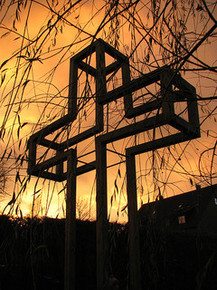 cross / benefit of hindsight “… it doesn’t take much to see that the problems of three little people don’t amount to a hill of beans in this crazy world,” Rick says to Ilsa as they part at the airport in Casablanca.
I know that against the backdrop of Sandy Hook Elementary School and those dead school children, the murdered school staff, a dead mother and the dead shooter, the issues of one person seem inconsequential. With this in mind, I dedicate whatever increased awareness I may experience in my life to the welfare of all beings, and may my knowing and growing in awareness add good to the world and reduce harm.
A day or so ago, I found a short writing by W.H. Auden on page 121 of Charlotte Joko Beck’s Nothing Special, Living Zen. It’s part of the chapter “Experience and Experiencing.” It goes through me like electricity, and I have to do what I do with thoughts that resonate. I memorize them. These are Auden’s words: “We would rather be ruined than changed./We would rather die in our dread/Than climb the cross of the moment/And let our illusions die.”
For me to live with those lines skillfully, I need to alter the lines to read first person singular. And because I would not rather be ruined than changed, I say no to being ruined and yes to being changed. Then I tiptoe to the line that has me climbing the cross of the moment. There, I stay and feel deeply what it would mean to let go of these thoughts that have created the world I live in, a world not always the same as the world as it is. Auden’s last line “And let our illusions die” spells out the consequences of being present to reality rather than deluded by familiar patterns. This letting illusions die is scary.
To live free from illusions, I can’t just grab the nearest weapon and lash to the right and thrust to the left to kill them. What’s required are patience, awareness and kindness. Through meditation, I practice moments of each.
Auden speaks of illusion. I have heard dharma talks use the term delusion. By delusion Buddhists mean there is a real world, vast, amazing and terrific. And then there is the world made by thoughts. Unfortunately, people, myself included, tend to substitute what our minds have constructed. We rely on our own interpretations of what is real and it’s usually not what is truly real. I know this is so in my case.
When an experience fits a familiar pattern and arouses familiar feelings, no matter how uncomfortable, I know who I think I am. And when I am interpreting my current life from inside that world, created long ago, I am likely to cause harm. To myself or someone else.
Here is an example from a recent experience ushering the Nutcracker at the War Memorial Opera House in the top balcony, second aisle from the door on the odd number side. Instructed by the head usher when to seat latecomers, I held back some stragglers, but the usher at the door told the usher one aisle down to seat them in my aisle. I told her it was not the right time, but still she led the party down the steep, dark aisle. It’s my aisle, for which I am responsible. I, I, I. Yes, I am angry. So familiar. Who did she think she was? Who did I think I was or was not? Not takes precedent when the past repeats. Not enough, not regarded, not responsible. Not happy. So familiar. So many illusions.
What follows then are 10 illusions that help to shape my inner world. These are illusions I am willing to let die:
1. Beings are separate.
2. Self-stories define me.
3. Life as I know it requires hating.
(Maybe not hating but certainly taking an aversion to
anyone who hurts my feelings. This based on experiencing hurt feelings as meaning
I am of no-consequence.)
4. Comparisons are worth making.
5. Information equals wisdom.
6. Being wrong is wrong
7. Not knowing causes intolerable pain.
8. Only pleasant experiences need apply.
9. Being understood feels necessary.
10. Causing no harm is possible.
And finally, this illusion: Voices with small messages should be silent in view of the randomness, unpredictability and delusion that characterize much of this world. Thus, with humility, no Christ, I offer this small insight into one struggle to “become a mighty kindness.”
 Tree in Los Osos / Alison R. Choosing three words that best express my philosophy of life provides endless hours of pleasure. Elizabeth Gilbert entitled her bestselling book with her three words: Eat, Pray, Love. I saw the movie and liked the “eat” part best. Ann Lamott calls her new book on prayer, Help, Thanks, Wow. Until last week, my three as yet unpublished words were “Oh, And, Yes.”
I’m not going to spend a lot of time explaining these words because I replaced them two days after Thanksgiving. My “Oh” sounds like “Oh, I didn’t know that, but it is a pleasure to learn.” “And” means more or different information isn’t a contradiction but an addition. And “Yes” expresses my willingness to acknowledge whatever arises.
But on my way back from my Thanksgiving visit to my son, 28 year-old grandson and five-year-old granddaughter in Los Osos, I came up with a new three-word philosophy. I kept the “And” as crucial to non-duality, and put “This” in the first and third position to produce “This And This.”
To imagine me discovering meaning in these particular three words, two of which are the same, you have to see me behind the wheel on cruise control with inactive feet and legs, traveling north on 101 around 7:30 a.m., arms equidistant from each other on the wheel. Just as the thought of multiple ways of perceiving the world came to mind, I had an “Oh” moment and my arms vibrated. I needed that embodied experience to know that this thought has legs. I was thinking about the other grandma to my granddaughter and contrasting our styles of grandparenting.
In Los Osos both of us were staying in my son’s house, sharing the pleasures and the frustrations of our five-year-old charge. At first, the other grammy’s style annoyed me. Why should the child need her long hair brushed out of her eyes every time it ecaped from its rubber band? She could see well enough, as far as I could tell. Moreover, each time the brush neared her, she screamed and tossed her unkempt hair into real disarray. Faced with such a mop head, I mostly didn’t care enough to press the issue. However, the other grammy approached the problem stealthily, circling behind the couch, grabbing the hair and somehow with much reassurance that it would not hurt and would only take a minute, tying it back again. This gambit gained her temporary control.
I admit I preferred my way of coping with stray hair, the no-way way. I thought that by insisting at that moment, the other grammy needed to imprint the little girl’s experience with her approval or disapproval. That was my way of sitting by and judging. I, on the other hand, sat silent or played with the little girl as if I too were five.
Leaving Los Osos and the other-grammy experience behind, I had that “Oh” moment in the car. It occurred to me that one way of being with this child might not be better than the other. Did both ways have value? Did I think the order-imposing grammy was inferior to the grammy who mostly let the child have her own way?
I must have really needed to feel good about myself, even at the expense of the other grammy. Was I hoping the child would prefer me to her? After all, she was also the grammy who snuck gum and candy to the little girl despite daddy’s rules. But aren’t grandparents usually the ones who spoil the child? My son’s beloved Grandma Doris certainly spoiled him every chance she got. Maybe the other grandma had it more right than I did, and I was just trying to excuse being lazy in the grandparenting department.
As I drove north early Saturday morning leaving the other grammy there for two more days, I started to rethink my reaction to all things not me or my way. Oh, what if one grandmother doesn’t have to be better than the other? What if I don’t need to feel right and could accept everyone’s style as representative of what they do because, well just because? And what if I really could avoid judging or comparing my way to other ways. Suppose I did not choose sides, either for my way or against it. What if I could just experience things as they are and not have to grasp after my own way of doing things to prove I am superior, or even okay. What if I really began once and for all to accept that there will always be “This And This.” What if. Two new words to consider.
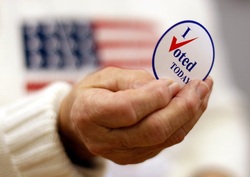 I expected Election Day to be a day fraught with being fraught. The possibility of political and social disaster loomed. Yet for me the day became surprisingly productive and stress-free. This is not what I would have predicted when I joined my friends for our Tuesday weekly morning women’s group. Like everyone else’s, my check-in included the admission that uncertainty was hard to handle. Only one of us could say she felt calm She said worrying stopped once her vote was cast. While the worriers among us were glad for her, her calm did not seem catching.
But maybe calm is catching. Maybe what other people say about how they live in this world does make a difference. Or maybe just admitting my anxiety made it disappear. It just went. I still can’t explain exactly why. I can’t account for why that fearful Tuesday turned into one of the most productive and peaceful days I have ever experienced. How was it I entertained no useless thoughts? How did I manage to clean out the dresser drawers, sort through the closet, make a collage and usher for hours at the opera house where Tuesday night was four-and-a half-hours of Richard Wagner’s Lohengrin? And all this with no angst.
Do you know what it is like for an anxious person to suddenly experience quiet? No voices within to track my positives and negatives. No voices telling me, “You don’t have a plan.” I queried my body and found no answering tensions or restrictions. It was so quiet.
Considering Tuesday from a Wednesday perspective, I see that I focused my energy on those things I could control. And yet my attention didn’t feel forced. Neither resigned nor unaware, I went about my life quiet and focused.
What really stood out about the way the day went was that nothing I actually did was on a “to-do” list, rather the tasks felt close at hand and effortless. Perhaps they required pre-planning like what to do with socks that come up singles, with mittens, or with the tee shirts with logos that represent years of past affiliations or are gifts from friends. Had I thought through the dresser clean-out task as I typically do, I might not have done it.
Without preplanning, the closet was easy too. Everything short over the shoe racks, pants in the middle and coats in the closet closest to the door. What could be simpler?
Because I did not agonize over my “artistic” ability or question my creativity, the collage became effortless. I would have tackled the task eventually, but fear about artistic ability would surely have led me to postpone it. The collage could have remained an unassembled intention to commemorate the life of my daughter-in-law, struck and killed by a car last November. I had been collecting pictures and words, roses and ribbons that could, one day, be part of an artwork to honor her. On Tuesday, without thinking about it, I began to arrange these pictures on poster board, tear paper, glue the black rose, a vampire-related artifact because I know she loved Twilight movies, some black stones, and lace I tore off a girlfriend’s Valentine from years ago. Without judgments or self-talk, my collage took form, and the only effort I needed to control was where to glue, how much was enough and when to walk away.
As for the opera, because ushers need to arrive at the opera house an hour and a half early to receive instructions and assignments, I needed to be on duty and smiling from 5:30 until 11:30 p.m, except in the dark where my assignment was the top of the balcony in the center aisle. From that vantage point, sitting on a high chair marked “Usher on Duty” I watched the opera, except for the top parts obscured by the super titles. My job then was to ensure that standing room patrons, who paid $10 to watch, did not sit or lie in the aisles. With first intermission a little after 8, I went downstairs and passed Julie, who is in charge of the balcony ushers. She was smiling. Obama won the election, she said.
What more evidence could I need that good things happen whether or not I’m anxious. Tuesday, topped with Obama’s victory, turned out for me to be my first fret-free day in a very long time. Since then, anxieties have come back with as much power as before. I have fallen apart again and again, but I have the amazing memory of Tuesday, the day I felt fully present and quiet. Perhaps somewhere in that experience is a template for a life of less stress.
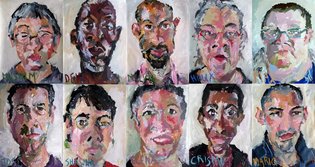 Photo from wall at EBMC / Facebook As often as a class opens at the East Bay Meditation Center and I can arrange to be in Oakland, I go. From Civic Center BART to 19th Street and up Broadway toward Grand takes about 25 minutes, less time if I hop the Richmond or the Pittsburgh Bay Point just as it or I arrive.* I try to go early to help set up the rows of folding chairs and lay the zafu and the zabutons, the cushions and the mats. If it is useful, I am a greeter, someone who checks off names, hands out material or suggests nametags, whatever the teacher asks for. If it is convenient for Mahogany, the event planner, she will take over just before the class begins. Once in awhile I register for a class and am wait listed. Ego might ask what is this about? I am a monthly donor, I practice dana, or “Generosity”; I help; I care, I…I…I. But I knows this is EBMC practicing its commitment to inclusivity and diversity. I can attend any function once that commitment has been met. “About EBMC” on their website tells me programs are for the widest possible audience. For example, some programs are specifically for People of Color, or the Lesbian, Gay, Bisexual, Transgender, Queer, Questioning, Intersex & Same-Gender Loving Communities. “This provides a safe space for individuals who daily confront the effects of oppression, racism, or homophobia and heterosexism in their lives, and who therefore may choose to initially avoid mixed programs.” I like being in a space that consciously chooses to be inclusive and diverse. The desire to be more than an onlooker in such a community could be rooted in my teaching years in the Los Angeles Unified School District at Alain Leroy Locke High School, an inner-city school built in response to the Watts Riots. I was a white teacher in a black community. One memory, in particular, continues to reconnect me to oppression and racism. I taught sports writing, so I often went with students to athletic events at other high schools. The Locke High Saints had an all-black basketball team and when it traveled to suburban parts of Los Angeles, I would take student reporters to cover games. On the way to Westchester High School, we passed a Locke Saint pulled over by the police, his body pressed against the side of his car. I recognized him as one of my students and yet I drove by, not stopping to intervene in what appeared to be harassment based on color. This happened in mid-1970. I have not forgotten. Teaching at Locke loosened any certainties I had. I learned lessons I might not have learned; the first one – to laugh at myself. The second, there is no “Black Student” there are only young men and women who call themselves by their first names with “dog” added. “Phill-dog” and “Trav-dog,” and out of respect, because I was the teacher, I was Ritt-dog. At East Bay Meditation Center, I am not the teacher with built in power; we are all equal. Our teachers are frequently people of color. I sit among learners, many of whom are much younger, but always we are an inclusive and diverse group. I am not at EBMC so I can “feel good” about my “goodness” or to make reparation for an act of cowardice. I want my Buddhist practice to include the fact that I am white, educated and economically advantaged. I don’t want meditation to be me closing my eyes to the ramifications of race and gender. I want to examine the cultural formulations that influence my responses – anything that keeps me from being present and responsive to others who have historically been represented as “less than” because history in schools was written by educated, middle and upper class European and European American men to justify the dominance of middle and upper class European and European American men. This is the worldview I was taught, but I want a better vision. Larry Yang writes about training to undo oppressing and being oppressed -- we have all been the perpetrator and the victim -- as “the journey towards narrowing the experience of separation.” Following these principles in his training, I commit to searching out ways to diversify my relationships and to increase my sensitivity towards people of different cultures, ethnicities, sexual orientations, ages, physical abilities, genders, and economic means. I commit to examining with wisdom and clear comprehension the ways that I have privilege in order to determine skillful ways of using privilege for the benefit of all beings. I commit to the practice of generosity in all aspects of my life and towards all human beings, regardless of cultural, ethnic, racial, sexual, age, physical or economic differences. ** Mine is that path of inclusivity and diversity each time I register to attend a class or meditate at EBMC as well as each time I am wait listed. * EBMC is moving to 285 17th Street near Harrison and three blocks from the 19th Street BART Station.
**On the website www.eastbaymeditation.org is a PDF document by Larry Yang, Directing the Mind Toward Practices in Diversity
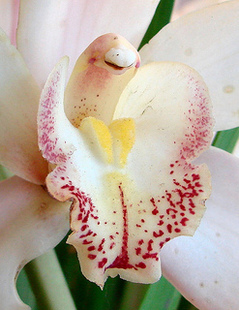 Orchid / Don Graham “My vagina is crooked,” our friend says. The rest of us women gathered in the back room of the coffee shop look at her with interest. We wonder how the conversation about the benefits of a gluten-free diet brought her to this observation. She stands, stretches. Is this what she needs to do to deal with the problem? I won’t give advice. Or ask for an historical perspective such as when she first noticed it was crooked? In fact, my mind entertains no thoughts at all. I am taken aback at the unexpected direction in which the hour seems headed. Then she walks to the opposite wall and straightens an abstract painting that from her vantage point could, I suppose, be construed as a female body part, depending on one’s perspective. Others observe that perhaps the picture that is “her vagina” is straight but the wall itself is crooked. Our friend straightens the picture and sits down. The room does seem to tilt toward the windows at the cafe where my weekly group meets. A second friend remarks that her fireplace isn’t straight and the large television screen above it seems crooked but isn’t. Again, it depends on perspective. Some time ago, we had stopped talking much about what had brought us together in the first place – weight issues and how to improve our eating habits or, for that matter, improve ourselves. Fixating on changing deeply ingrained habits didn’t feel wise or interesting. Our weekly hour together has become more than figuring out what’s wrong. In fact, it seems as if the real value of meeting is sharing perspectives. The world I inhabit, the world of the 127 dharma podcasts, the ring of the singing bowls I can’t seem to do without is very unlike the world of my friends. One friend knows football! I love hearing her talk about the 49ers from the perspective of someone who has really liked Alex Smith, the quarterback, when everyone else, the press included, was dinging the young man. I was curious if she planned to buy seats in the new Santa Clara facility. I had already made up my mind that it was a rip off and an example of corporate greed. But when I heard how she reasoned before deciding, I stifled my opinion. I was happy she was happy. Another of my friends is a minister in a faith I would not choose to follow. Yet hearing her talk about her personal convictions and her experiences with her church interests me more than any urge to mount an opinion and charge into a dispute about faith. In the course of facilitating our discussions, I may introduce what I think is a profound topic. Often, I learn that when seen from other group members’ perspective, this “topic” is neither profound nor an issue, but part of the human condition. After a questioning “oh,” my “oh-so-serious” drains away, and the issue settles into another occasion for multiple points of view. However, there are sometimes ideas or vantage points that are totally unavailable to me, and no amount of trying to look from another perspective works. This is especially true for me with logical folks who read or write budget reports or navigate numerical concepts. I realize not knowing doesn’t mean I am stupid or need to change. I can do fine without this point of view. There will always be other people who can explain what I don’t know. That’s the beauty of being part of an interconnected, interdependent world. Maria Konnikova in “Lessons from Sherlock Holmes: The Importance of Perspective Taking” writes, “Perspective-taking is a tremendously difficult endeavor. It is far simpler to use yourself as the prototypical actor, often without realizing you’re doing so, instead of separating yourself entirely from the exercise. But it is nevertheless an essential skill. And so, we must use every possible tool at our disposal to improve our ability to see the world from a vantage point that isn’t our own.” I agree with Maria; yet it isn’t always easy to avoid being frustrated or shut down when I don’t “get” someone else’s perspective. This happens a lot at congregational budget meetings. Luckily for me, sitting meditation eases my distress with not knowing or having the tools to see what I am ill-equipped to see. By just sitting I create a container for not knowing. When I am just sitting with “monkey mind” at rest, without an opinion, aware of the in-breath, aware of the out-breath, I am acquiring a perspective some call the “ocean,” others “Big Mind" within which swim all points of view. From this acquired vantage point, I can see the big picture including the one on the wall in the back of the café that looks like a vagina to one of my friends.
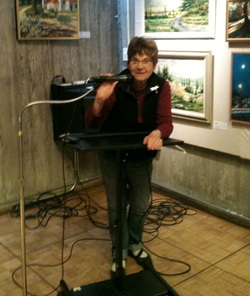 Checking out the venue / Stan Hartzell It feels really good to have been asked to speak at the Forum next Sunday morning at the Unitarian Universalist Church in San Francisco. I don’t mind that it’s because the scheduled speaker canceled; she thought her venue was Las Vegas and not farther west. Sure, I’m a last-minute filler, but I have been asked to do what I gladly do anytime I’m asked. That, of course, is talk.
I used to be on the chancel often as a Worship Associate, speaking my four-to-five minute personal statement or “credo” as we called these short talks given from the lectern. We shared our personal truths in response to the topic of the minister’s sermon, often putting a personal face on a generality.
I got to revel in pride, gluttony, lust and envy. I revealed falling in love and years later catapulting out of the relationship I fell into five years earlier. So that is a lot of sharing. It’s possible that the congregants now know more about me and other Worship Associates than they might know about some of their close acquaintances.
One of my Worship Associate colleagues spoke of the grief, confusion, and disappointment of having her foster adopt daughter taken back many months after the entire church had embraced her, her wife, and their baby. Hearing her tell the truth of their loss opened our hearts. And that is all to the good because the point of church is to open hearts.
Those who look to Biblical authority for how to talk to each other, can check out Ephesians 4:15 where we are admonished to “Speak the Truth in Love.” The opportunity to speak our truths in love and to be heard is more than self-centered pleasure at not being interrupted or disagreed with. In that spirit we give as well as receive a gift.
Krista Tippett in Speaking of Faith: Why Religion Matters—And How to Talk About It writes: “...time and space become more generous when we explore ultimate truths in the presence of others. We make the discovery that when we are honest and vivid and particular in describing what is most personal and important in life, we can summon universal and redemptive places at the every edge of words.”
To myself I make the commitment to speak my truth in such a way that my story can awaken compassion and encourage interconnection. I want those who hear me to know that the story may be mine, the specifics mine, but the feelings are theirs as well. If I speak about loss, it is because loss has touched us all. If I sometimes sound self-deprecating it is in the spirit of laughing because, as Hafiz the poet puts it, I still think I have “a thousand serious moves” in the chess game in which I face a superior opponent who knows that my losing or winning are all the same.
It is because pain is certain and we will all suffer that we must learn to love each other. I want those to whom I speak to experience this compassion we all have within us. That is a gift I hope to give with my personal stories.
I love what Madeleine L'Engle says in Walking on Water. “Stories are able to help us become more whole, to become Named. When we name each other, we are sharing in the joy and privilege of incarnation, and all great works of art are icons of Naming.”
Though I can’t guarantee my talks are great works of oratorical art, it is my goal to name my experience in such a way that those who hear me will be encouraged to name their own experiences and speak them so that when we walk among each other we have more than a single story by which to define this community in which we live and love.
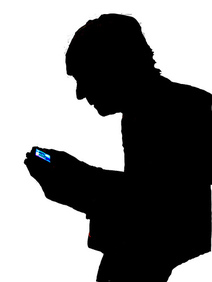 Games Player/Robin Hutton I had this to say from the chancel at the Unitarian Universalist church Sunday, August 12 on the topic of what gamers can teach us about church. I want to share with all of you. Comments welcome.
I know almost nothing about Alternate Reality Games. Sometimes a Facebook friend asks me for cows or pigs on Farmville, but I generally ignore their requests. So this reflection is my chance to look at some of the ideas that interest Reverend Jacks. And to borrow gamer’s lingo, I feel on the verge of an epic win.
Now that I know what they are, I will be referring to alternate reality games as ARGs rather than aaarrg which is what pirates say as in Aaaargh, matey. And I hope in response to my quick assimilation of jargon, you will level me up or plusoneme on my use of terminology or UOT, as I am now calling it.
It turns out that both Reverend Jacks and I plan to explore our church experience from the playful perspective of creating our own UU Universe at 1187 Franklin. We each have in mind an alternate religious reality so exciting and engaging, so full of rewards, we willingly pay to be part of it. And if this church is that for you already, think about your personal payoff and how you can make that possible for everyone.
So what can we learn from ARGs? Why do people want to immerse themselves in these unrealities? Those who know say it’s the following: a feeling of urgent optimism due to a reasonable hope of success, the ability to weave a social fabric that makes you like people better, and offers a payoff of epic meaning. According to Jane McGonigal, author of the book Reality is Broken, How Games Change the World and How They Make Us Better, the most popular ARGs guarantee us the four rewards she says we crave most: more satisfying work, better hope of success, stronger social connectivity and more meaning.
It will help to know we UUs already have a lot in common with ARGs. The narrative behind an ARG must be inferred from rules that are not specified at the outset but must be uncovered in the process of the game. Likewise, we UUs pride ourselves on needing no defining creed to arrive at our common values. In an ARG we choose our particular alternate reality, similarly we choose when and how we will be part of the UU Universe.
In my UU Universe, step one will be to design a stunning avatar. I want her to be cuter than I am. I want her hair always the same color with no scheduled salon appointments. I invite you all to imagine your cute self.
The next step is to evaluate our current UU reality. For example: on a scale of one to ten how satisfied are you? Joyful? Empowered? Connected? Inspired? Scoring at the upper end, you know your needs are being met in your church experience. If you are at the low end and you’re still here, you must have something else interesting going on and we could benefit from knowing about it. If all of this seems ridiculous, so much the better if it leads to laughter rather than to cynicism and complaining, of which we already have our share.
So how do I score myself? What brings me back? For me no other religion is as rewarding as Unitarian Universalism because it welcomes wisdom from many sources including the Judeo-Christian. I feel deeply and joyfully connected to many in this community whom I have met through Small Group Ministry, on committees, and doing other work of the church. I show up because these people’s wellbeing matters to me.
How do you score yourself? Some people feel satisfied in their current UU Universe; they have found the right place for their talents and desired level of involvement. Some sing in the choir, gather in small group ministry to explore ideas, some teach in religious education, some feed homeless men in the winter shelter, some trash talk to keep us green, some serve youth in the community in Up on Top, some make fruit salad for the Forum, or eat lunch and listen to speakers at SCW and so on or working for social justice.
But I can’t score my experience on the high end for everything. Despite what I love, I feel less engaged here than in other endeavors. I find myself wanting more meaning, more to remind me of the larger humanity of which we are a part. Some of my malaise may be because I miss hearing the truths that shape the lives of others in our community. Hearing their wisdom during Sunday services moves my heart.
Part of the allure of an ARG is that it makes space for a range of talent while managing to fulfill everyone’s needs. And in our UU Universe, everyone is not going to want the same experience. But each of us can feel we are doing what we are good at to make this community cohesive as we circle outward from those places of individual meaning to create a more generous reality of sharing.
When finally, I design an avatar for my UU Religious Reality, I will give her long embracing arms, a speaking presence, a beaming face with a ready smile, two or more really big ears and year-round hair. What will you look like in your religious reality?
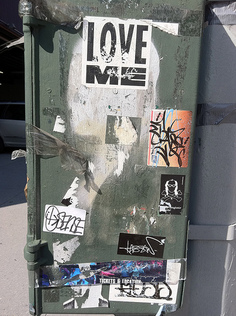 The feelings back/underdestruction “Who do you think you are” can issue like a challenge when the asking voice sounds angry or affronted. Otherwise the question could just be an inquiry that awareness wants to ask the self. Kind of like checking in before getting down to business. I suppose there are ways in which the question is simply rehashing history, like thumbing through a file cabinet of folders labeled such things as retired high school teacher, mother of three sons, grandmother to three, most recently, a four-going-on-five year old girl. Possibly I can label myself a meditator if I keep sitting still. It’s an admirable identity, but right now more wishful than accurate. I am a Unitarian Universalist at 1187 Franklin in San Francisco. And oh, look, I see I am a person who is carrying a grudge. I don’t like to be limited by identity labels; I want them to peel off easily. Perhaps not the ones like I had sons when I was young, and some of them had kids. Or the fact that I did hold a job in the Los Angeles Unified School District (I have former students as friends on Facebook to prove that I was there). But grudge-holder is not a label I like. Not that I don’t think I’m entitled to my ire. Yet it’s my hope that this label, with a little work, can be peeled away. Why would I be attached to a feeling that causes suffering and can’t be doing anyone else any good? Truth be told, holding this grudge borders on pleasure. There’s a reassuring sense of self involved in revisiting hurt feelings, as if this particular core wound of mine requires an occasional prodding to remind me of who I think I am. At the heart is self-esteem. I have it, but it appears to be attached to getting plenty of positive feedback, and when someone doesn’t respect who I think I am, my feelings get hurt. Continuing to hold a grudge reminds me that I value myself and that someone in my orbit doesn’t know who I think I am. This wanting to have worth recognized seems important enough to apply to all beings. As I move among others, I want to validate for them their worth. I want to take the time, be present, so as to discover how and where they are holding their worth. And, above all, I want them to know that I recognize their value. It takes some care to even partially discover the multifaceted reality that is a human being. And I hold a grudge because a person who should know better (my label) didn’t have the perspicacity to discover the me whom they labeled “Doesn’t matter.” Okay, so compassion is an option. I could wear this identity label more lightly and be willing to loosen it so as to avoid a lot of insecurity, fear, and suffering. Yes, letting go. That’s a wise practice. Martha Beck in a CNN blog posted April 25, 2008 gives good advice on how to let go. She says, “Be still. The process of releasing your labels without losing yourself begins in stillness. If we hold still long enough, we begin to feel what we really feel and to know what we really know - a prospect so terrifying that some people bolt rather than face it. If you can do this - get used to sitting still until you feel what you feel and know what you know - your labels will start peeling away like onion skins.” What makes it difficult for me to peel away the grudge label is, as I said, the discomfort of forfeiting a reassuringly familiar sense of self, a core identity as a person hungry for approval. Doesn’t make me proud, but I am used to being that person. An even bigger question then becomes who do I think I am if I am not the person I always thought I was. But Beck promises a pretty big pay off: “Eventually, you will begin to sense a very deep self that defies all labels, a calm soul who has experienced your whole life. . .without ever being dominated or extinguished. This is the you who wears your labels, who can toss the ones you've outgrown [or that never fit in the first place], who will always find another identity to wear when a familiar one disappears.” Learning to peel away my labels is on-going. “You are what you learn” is Dilbert creator Scott Adams’ answer to the Who Are You question. And that, to my mind means paying attention to the lessons life presents. He says there's almost nothing you can't learn your way out of. I read that as an opportunity; if I don't like who I am, I have the option of learning to hold my identity more loosely and with greater compassion. “Life is like a jail with an unlocked, heavy door. You're free the minute you realize the door will open if you simply lean into it,” he says. Meanwhile there’s a grudge waiting, a heavy door to be pushed open, a label to be loosened.
|










 RSS Feed
RSS Feed